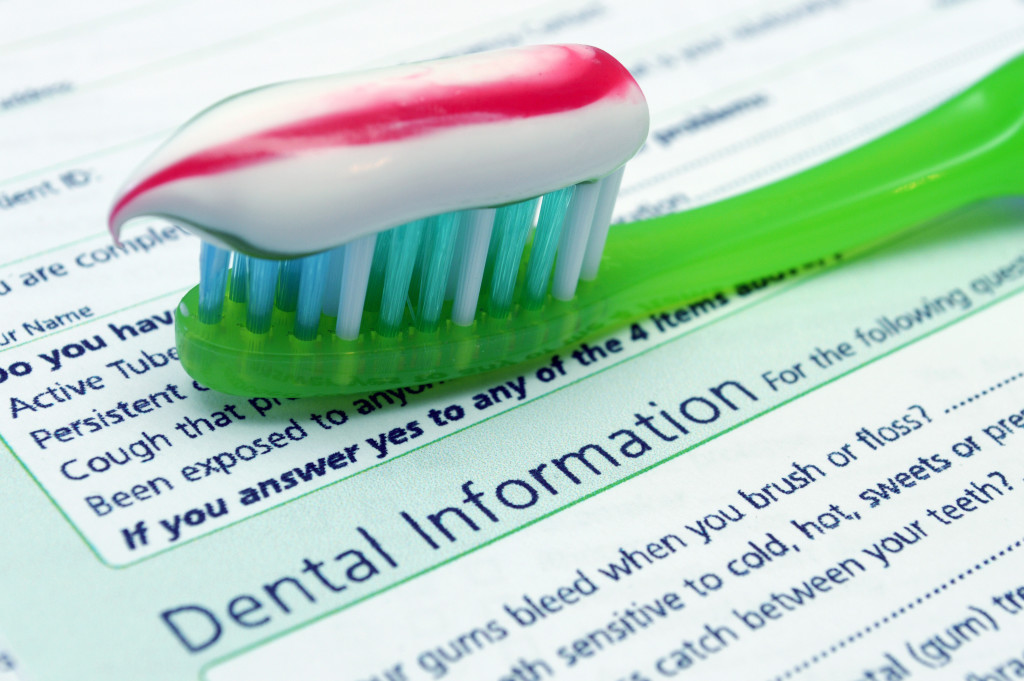
February is Dental Health month, so we are celebrating through an informative interview with Dr. Carol Felder. She is a Norwalk-based family dentist and mom to two (adorable!) little girls.

Q: When should children have their first formal dentist appointment?
A: By age 1.
Q: What should they expect at this visit?
A: It will be easy, simple, and fun. You’re there to count teeth. Children identify with the counting of numbers as it’s already been introduced into their lives so it’s just an opportunity to get them into the office and familiarize them with the procedure.
Q: How can they be best prepared to have a successful visit?
A: I suggest reading books. I also suggest incorporating brushing every morning and every night so they are already used to the brush in their mouth.

Q: At what age should parents begin brushing a child’s teeth with training toothpaste?
A: As soon as the first tooth comes in – which is an average age of 6 months. I suggest using training toothpaste until about age 5 when children can properly spit. They should be brushing for two minutes in the morning and at night. I highly suggest electric toothbrushes for children because they’re timed and they do the actions for them, especially if a child is not a great brusher. The one that I love is Sonicare.
Q: What about mouthwash?
A: I don’t recommend it as much when they’re young because they have a problem with swallowing it – if children are doing well with brushing properly twice a day, it’s not as critical.
Q: What are the worst culprits of dental problems in children?
A: Juices, candy, and even milk for infants – especially bedtime milk, not brushing afterwards or wiping the mouth clean. There is sugar in milk (lactose) which not a lot of people realize.
Q: At what age should children begin losing their baby teeth?
A: The average age is 6 to lose the first tooth but I have seen it as early as 4. I’ve also seen a few babies in my years of practice who were born with neonatal teeth. Because this tooth is not part of the first set, it’s an abnormality, and it needs to be pulled once it becomes loose so the child is not at risk of swallowing the tooth.
Q: What advice would you give for any parents or caretakers of children who have teeth knocked out during play? What should they do?
A: Put the tooth in a cup of milk and try not to manipulate it at all. Bring it (the tooth) in with the child to the dentist asap. Ice can be applied to reduce gum swelling and children’s pain medication (like Tylenol) can be given if the pain is severe enough. If it’s bleeding, compress the area.

Q: What about other advice for parents, specifically mothers?
A: Start brushing early, every morning and night. It really develops into a lifelong habit. Most people who don’t brush twice a day, never did. Visits should be bi-annually (every 6 months). We should also encourage healthy eating habits (fruits, vegetables), drinking water and limiting the juice drinking and sweet-eating to special occasions.
Q: What are your thoughts about pacifiers and thumb sucking?
A: Pacifiers are easier to deal with because they’re not on the body, but I’m not a proponent of them. For a colicky baby who needs the soothing it’s understandable. With pacifiers, they should be taken away by age 2. As for thumb sucking, when a baby is old enough, give them something else to keep their hands occupied with while they are awake to prevent thumb sucking. From parent feedback, I’ve heard that deterrents like paints, mittens, or nail polishes aren’t particularly effective. I would suggest removing the thumb after a baby has fallen asleep. Using other soothing methods like rubbing the back or reading a bedtime story can sometimes help. With thumb sucking, look for teeth contact upon closing of the mouth (or lack of) in addition to changing palate shape.
Q: What advice would you give to pregnant women about dental health? What, if anything, is different during pregnancy?
A: If you’re planning for pregnancy, get all of your treatments done beforehand. Otherwise, wait until the 2nd trimester for major work. Knowing that the hormones in pregnancy can cause inflammation of the gums, it’s extra important to go to cleanings regularly. A lot of people think you shouldn’t or can’t go, but you should.
Q: What about fluoride?
A: There have been changes in our eating and drinking habits. Years ago, we used to rely on fluoridated water but now we are getting and drinking bottled water which does not have fluoride. Children need it, when they’re old enough, from either fluoride in their toothpastes or at their dental visits when we do topical applications.
 Q: Is it difficult for you to talk to parents about what they need to change in their children’s dental routines?
Q: Is it difficult for you to talk to parents about what they need to change in their children’s dental routines?
A: Hard for parents to accept because they sometimes look at it as failure. I try to educate them rather than scold. The goal is to change habits. Often, kids with cavities have parents with cavities. It’s important to know that the disease that causes cavities is transferable. I tell pregnant women to really take care of their teeth. Parents who bottle test (for temperature), or food/spoon/straw share don’t always know that the bacteria can move between parents and children. Most people don’t know that.
Q: What advice do you have about teething?
A: No medication teething products should be used. Just soothing mechanisms like the teething rings. I’ve also found that brushing in infancy (even before teeth are present) and using a warm cloth – rubbing and massaging – tends to toughen the gums and alleviate the pain of tooth eruption when that does happen.
Thanks to Dr. Carol Felder for providing us with a wealth of knowledge about dental health!


























